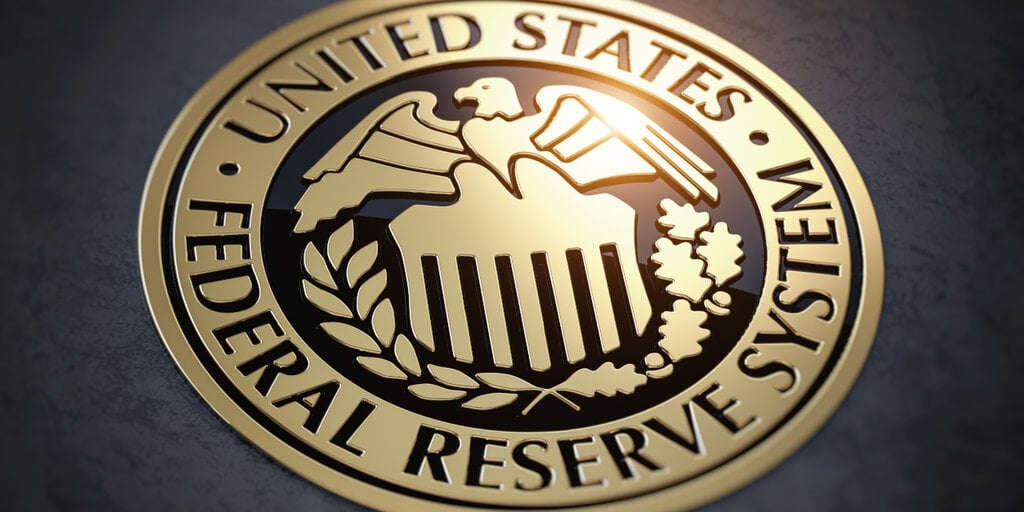Fed Must Make Emergency Rate Cut to Avoid US Turmoil, Says Top Economist - Decrypt
08/05/2024 20:27
The lack of movement so far “makes absolutely no sense,” Wharton's Jeremy Siegel tells CNBC.
Amid an avalanche of sinking markets and poor economic data, a prominent economist is urging the U.S. central bank to start cutting interest rates at a pace far faster than markets expect.
Jeremy Siegel, professor emeritus of finance at Wharton School of Business, said on Monday that the Fed funds rate should already be between 3.5% and 4%—1.5% below its current 5.25% to 5.5% target range.
"I'm calling for a 75 basis point emergency cut in the Fed funds rate, with another 75 basis point cut indicated for next month at the September meeting, and that's minimum," Siegel said during an interview with CNBC.
"I'm calling for a 75 basis point emergency cut in the Fed funds rate, with another 75 basis point cut indicated for next month at the September meeting - and that's minimum," says Wharton's Jeremy Siegel: pic.twitter.com/s4CgWx962Q
— Squawk Box (@SquawkCNBC) August 5, 2024
A basis point is one-hundredth of one percent, meaning a 75 basis point cut would be a reduction of 0.75%.
The economist’s recommendation follows disappointing jobs numbers that fueled fears of a U.S. recession last week, alongside macroeconomic instability spurred by the Bank of Japan raising its interest rate above 0%. Both forces together have wreaked havoc on stocks and crypto, with Bitcoin plummeting under $50,000 on Monday for the first time since February.
For many, the weekend’s crash has been reminiscent of March 2020, when a mass market selloff occurred amid worries surrounding the coronavirus pandemic. In the aftermath, central banks worldwide stepped in to provide liquidity and lower interest rates, helping stocks and crypto quickly rebound to all-time highs.
The last time global capital markets panicked was March 12, 2020, when the reality of COVID set in.
Bitcoin's price fell 37% that day, from $7,911 to $4,971. A year later, it was $57,332.
People smash the sell button for liquid assets during broad-based panics. But from my…
— Matt Hougan (@Matt_Hougan) August 5, 2024
According to Siegel, also a senior economist at WisdomTree Investments, it’s already high time for another cycle of Federal Reserve rate cuts.
“The Fed has said that the long-run fed funds rate—when inflation reached 2% and unemployment has come up to 4.2%—should be 2.8%,” Siegel explained. Last week, July unemployment clocked in at 4.3%, while CPI inflation reached 2.97% in June, which is 90% progress from where the Fed started.
“How much have we moved the Fed funds rate? Zero,” said Siegel. “That makes absolutely no sense whatsoever.”
Inaction, he adds, could be disastrous.
“If they're going to be as slow on the way down as they were on the way up—which, by the way, was the worst policy error in 50 years—then we're not in for a good time with this economy,” he said.
Though most expect the Fed to begin cutting rates soon, Coinshares’ head of research James Butterfill thinks a 1.5% cut by September is a bit over the top. He believes a 50 basis point cut in September is still the most likely course.
“The Fed [is] likely to be cautious in being overly reactive despite one of their implicit mandates being a stable market,” Butterfill told Decrypt. “If the markets were to deteriorate significantly further, it may prompt an August rate cut, but so far unlikely.”
Per CME Fedwatch, the market is now pricing in 83% odds of a 50 basis point cut in September.
Coinshares is among several analysts who believe lower interest rates will be bullish for fixed-supply assets like Bitcoin. While generally good for stocks, AJ Bell Investment Director Russ Mould says the effect of an approaching recession could still mean bad news for equities.
“Those with long memories will remember how frantic rate cuts in 2000-02 and 2007-08 failed to stave off a bear market in stocks,” he wrote in an analyst note Monday. “Because the economy tipped over and corporate earnings fell far faster than the headline cost of money.”
Edited by Ryan Ozawa.
Daily Debrief Newsletter
Start every day with the top news stories right now, plus original features, a podcast, videos and more.